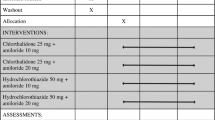Summary
In an open triple crossover study in 8 patients with essential hypertension, the possibility has been investigated of whether the blood pressure lowering effect of hydrochlorothiazide 50 mg once daily was attenuated by co-administration for 4 weeks of ibuprofen 400 mg t.i.d., diclofenac 25 mg t.i.d. or sulindac 200 mg b.i.d. Only a slight, statistically non-significant change was found, with the exception of a significant increase in systolic blood pressure after 4 weeks treatment with ibuprofen. There was considerable variation in the blood pressure response during treatment with all three NSAIDs, with slight rises in blood pressure in 13 out of 24 periods. Body weight increased significantly on treatment both with ibuprofen and diclofenac, whereas the increase on sulindac was less and was transient. No significant change was found in various biochemical parameters, including plasma electrolytes, plasma renin activity (PRA), aldosterone, albumin and creatinine, in haematocrit or in the 24-h urinary excretion of sodium and potassium. The sole exception was a decrease in PRA during ibuprofen treatment. From these observations it is concluded that ibuprofen and diclofenac differ from sulindac in their interaction with the diuretic action of hydrochlorothiazide. It appears that all three NSAIDs can safely be combined with hydrochlorothiazide in hypertensive patients, but blood pressure should be monitored carefully when an NSAID are added.
Similar content being viewed by others
References
Agnolt J, Andreasen F (1982) The effect of ibuprofen therapy on water and electrolyte balance. Acta Med Scand 212: 65–69
Bunning RD, Barth WF (1982) Sulindac: A potentially renal sparing non steroidal antiinflammatory drug. J Am Med Assoc 248: 2864–2867
Ciabattoni G, Pugliese F, Cinotti GA, Patrono C (1980) Renal effects of antiinflammatory drugs. Eur J Rheumatol Inflamm 3: 210–221
Ciabattoni G, Cinotti GA, Pierucci A, Simonetti BA, Mauzi M, Pugliese F, Barsotti P, Pecci G, Taggi F, Patrono C (1984) Effects of sulindac and ibuprofen in patients with chronic glomerular disease: evidence for the dependence of renal function on prostacyclin. N Engl J Med 310: 279–284
Clive DM, Stoff JS (1984) Renal syndromes associated with non steroidal antiinflammatory drugs. N Engl J Med 310: 563–573
Drayer JIM, Benraad ThJ (1975) The reliability of the measurement of plasma renin activity by radioimmunoassay. Clin Chim Acta 61: 309–324
Gerber JG (1983) Indomethacin induced rises in blood pressure. Ann Int Med 99: 555–559
Huskinson EC (1977) Antiinflammatory drugs. Semin Arthritis Rheum 7: 1–20
Koopmans PP, Thien Th, Gribnau FWJ (1984) The influence of non steroidal antiinflammatory drugs (NSAID) on the diuretic treatment of mild to moderate essential hypertension. Br Med J 289: 1492–1494
Koopmans PP, Thien Th, Thomas CMG, van de Berg RJ, Gribnau FWJ (1986) The effects of sulindac and indomethacin on the antihypertensive and diuretic action of hydrochlorothiazide in patients with mild to moderate essential hypertension. Br J Clin Pharmacol 21: 417–423
Ku EC, Wasvary IM, Cash WD (1975) Diclofenac sodium (GP 45 840 Voltaren) a potent inhibitor of prostaglandin synthetase. Biochem Pharmacol 24: 641–643
Lifschitz MD (1983) Renal effects of non steroidal antiinflammatory agents. J Lab Clin Med 102: 313–322
Lopez-Ovejero JA, Weber MA, Drayer JIM, Scaley JER, Laragh JH (1978) Effects of indomethacin alone and diuretic or beta-adrenoreceptorblockade therapy on blood pressure and the renin system in essential hypertension. Clin Sci Mol Med 55 [Suppl] 1: S203–205
Man AJM de, Hofman JA, Hendriks Th, Rosmalen FMA, Ross HA, Benraad ThJ (1980) A direct radioimmunoassay for plasma aldosterone: Significance of endogenous cortisol. Neth J Med 23: 79–83
Norbiato CA, Bevilacqua M, Raggi U, Mitossi P, Morahi C, Fasoli A (1978) Effect of prostaglandin synthetase inhibitors on renin and aldosterone in man on a normal or low sodium diet. Acta Endocrinol 87: 577–588
Schooley RT, Wagley PF, Lietman PS (1977) Edema associated with ibuprofen therapy. J Am Med Assoc 237: 1716–1717
Watkins J, Abbott EC, Hensby CN, Webster J, Dollery CT (1980) Attenuation of hypotensive effect of propranolol and thiazide diuretics by indomethacin. Br Med J 281: 702–705
Wing LMH, Bune AJC, Chalmers JP, Graham JP, West MJ (1981) The effects of indomethacin in treated hypertensive patients. Clin Exp Pharmacol Physiol 8: 537–541
Author information
Authors and Affiliations
Rights and permissions
About this article
Cite this article
Koopmans, P.P., Thien, T. & Gribnau, F.W.J. The influence of ibuprofen, diclofenac and sulindac on the blood pressure lowering effect of hydrochlorothiazide. Eur J Clin Pharmacol 31, 553–557 (1987). https://doi.org/10.1007/BF00606629
Received:
Accepted:
Issue Date:
DOI: https://doi.org/10.1007/BF00606629




